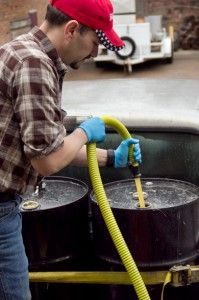Recycled vegetable oil becomes food, fuel

February 16, 2012
At 8 a.m. Friday, farmer Chet Stuemke drove around campus to collect barrels of used vegetable oil from the dining halls.
“This stuff will soon power this truck and feed my cattle,” he said.
The university’s Dairy Center started taking otherwise useless vegetable-oil waste from the dining halls and turning it into food and fuel last spring.
Advertisement
Stuemke, Dairy Center manager, proposed the idea of using vegetable oil from dining halls and converting it to biodiesel and glycerol four years ago.
Last spring, the Student Dairy Club was awarded a $51,000 grant from the university’s green fund and $5,000 funding from the university for the project. Since then, they have been setting up equipment and testing the process to ensure its success.
“Before this, the used vegetable oil was either being made into soap, or, more commonly, put into landfills,” he said.
He said about 90 percent of the collected oil is recycled.
Several times a week Stuemke picks up the barrels of the oil and takes them to the university’s vermicompost center, a form of composting using worms, where it is then put into a large tank and converted into biodiesel fuel. From there, the fuel can be used to power a diesel engine or be used to create a byproduct called glycerol. The byproduct can eventually substitute 10 percent of the Dairy Center’s cattle feed.
Stuemke said the project was originally faculty-based, but is now student-run.
Advertisement*
Amer AbuGhazaleh, dairy-science specialist and associate professor of animal science, food and nutrition, said he conducts the research for the project.
“I focus on studying and evaluating the glycerol to see how we can get the most out of it for the cattle,” he said. “We’re always trying to find alternatives to better our dairy center and this was a great one.”
AbuGhazaleh said the club used the grant to buy the biofuel converter and to buy equipment to test the product’s quality.
Phil Gatton, director of Plant and Service Operations, said the project ties into the university’s concept of sustainability.
“We were really excited to help the dairy center,” he said. “The fact that you’ve got food waste going out to the vermicompost and now we have this waste oil being processed and reused as well just shows that there are so many great things we can do to improve this university’s situation.”
The club’s plan has two phases to be instituted over five years. The goal of the first phase is to be able to convert the oil and make the Dairy Center eco-friendly. The goal of the second phase is to be able to implement it around campus and use it to produce electricity.
Stuemke said the idea of using biodiesel to produce electricity is not that abstract.
“All we would need is a biodiesel generator. Then we would no longer have to pay an electricity bill,” he said.
This would be a cleaner and safer alternative to coal power, he said.
Stuemke said the Dairy Center could eventually be self-sufficient.
“If we grow 40 acres of canola and pressed it, we could actually supply enough oil to cover all of the campus’ needs for a year,” Stuemke said. “Then we can take the oil after it is used and turn it into biodiesel to power all of the equipment to harvest the canola.”
He said the glycerol could be used to feed the cows, along with the compressed canola mash. The cows’ manure could then be used to fertilize the next canola crop, he added.
The Dairy Club’s main goal was to reduce the university’s footprint and save money.
Bunny LeBaron, chairwoman of the Green Fund Committee, said this project is the epitome of reduce, reuse and recycle.
“It’s a great step for this university and hopefully an example for local farmers,” she said.
Stuemke said the Dairy Center is basically the equivalent of a family farm.
“This is our opportunity to reach out to smaller farms and show them how to be efficient and that there are always new avenues,” he said. “This dairy farm may be an old facility, but we’re running on new ideas.”
Advertisement








